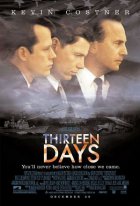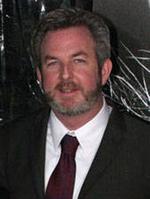
Thirteen Days Page #3
KENNY:
We hit a Nazi buzz bomb field in '45.
(beat, incredulous)
It looks like a rocket base...
He puts his hand out to touch the image, then turns and looks
to the President, knowing what they must be.
BUNDY:
On Sunday morning, one of our U-2s took
these pictures. The Soviets are putting
medium range ballistic missiles into
Cuba.
Shock. Silence. Kenny glances to the other men.
LUNDAHL:
They appear to be the SS-4: range of a
thousand miles, three-megaton nuclear
warhead.
KENNY:
Jesus Christ in Heaven...
INT. WHITE HOUSE OPERATOR'S CENTER - DAY
A bank of WHITE HOUSE OPERATORS work the switchboard, fingers
flying, voices overlapping in a babble of:
VARIOUS OPERATORS
Please hold for the White House...Mr.
O'Donnell for Secretary McNamara...
White House Operator... please hold...
INT. KENNY'S OFFICE - DAY
Kenny carries the phone with him as he paces hard from his
desk to his window.
KENNY:
The principals are assembling in an
hour. See you then.
Kenny hangs up. The President enters. A beat. And in that
beat, there's a void. The two men are off their emotional
stride, trying to grope their way out of shock.
THE PRESIDENT:
Where's Bobby?
Kenny nods, acknowledging the feeling
KENNY:
Should be here any minute.
THE PRESIDENT:
Good.
And we glimpse the chemistry of these guys by Bobby's
absence. It's like they're missing their third wheel.
THE PRESIDENT (CONT'D)
Good.
BOBBY (O.S.)
Where the hell are you?
The President and Kenny hear him out in the hall. And the
tension goes out of them instantly.
THE PRESIDENT:
In here!
They turn to the door as BOBBY KENNEDY, 37, the President's
younger brother/Attorney General, enters. Bobby shuts the
door behind him, falls into Kenny's chair, and clearly
grappling with his own disbelief, is hushed.
BOBBY:
Jesus Christ, guys. What the hell's
Khruschev thinking?
THE PRESIDENT:
Did you have any indication of this from
Georgi? Any possible warning or sense
of motivation?
BOBBY:
(shaking his head)
Complete snowjob. And then we went out
and told the country they weren't
putting missiles into Cuba.
(beat)
By the way, you realize we just lost the
midterms.
KENNY:
Who gives a sh*t about the midterms now?
The Soviets are putting nuclear weapons
ninety miles away from us.
BOBBY:
You mean there's something more
important than votes? Didn't think I'd
live to see the day, Ken.
The President paces away, grim.
KENNY:
Jesus. I feel like we've caught the Jap
carriers steaming for Pearl Harbor.
INT. WEST WING HALLWAY - DAY
The President strides down the plush hallway, Bobby and Kenny
flanking him. Unconsciously, all three men assume the same
gait:
confident, powerful, no longer disoriented.And before our eyes, the three men's game faces appear, and
they become the hard-ass leaders of the United States.
Secret Service Agents throw open the massive double doors to
the Cabinet Room.
INT. CABINET ROOM - CONTINUOUS
And they enter. The group of men at the long, ornate
Roosevelt-era table, rise as one.
GROUP:
Good morning, Mr. President.
THE PRESIDENT:
Good morning, gentlemen.
And the doors close on the eighteen men of EXCOM: The
Executive Committee of the National Security Council. They
are the legendary "Best and Brightest."
The President makes his way down the line: shakes hands with
Secretary of State DEAN RUSK, 53, distinguished, with a soft,
Georgian accent, a distant reserve.
THE PRESIDENT (CONT'D)
Dean, good morning.
RUSK:
Mr. President.
The President leans past him, grasps the hand of the
Secretary of Defense ROBERT MCNAMARA, 46, a gifted managerial
genius... the price of which is a cold, hard personality.
THE PRESIDENT:
Bob. Bet you had a late night.
MCNAMARA:
Sleep is for the weak, Mr. President.
OFF TO THE SIDE, Kenny greets Vice President LYNDON JOHNSON,
54, and ADLAI STEVENSON, 62, Representative to the U.N.,
intellectual, well-spoken.
KENNY:
Lyndon. Adlai.
The silver-haired war hero and politically savvy Chairman of
The Joint Chiefs of Staff, GENERAL MAXWELL TAYLOR, 50s,
shakes the President's hand.
THE PRESIDENT:
Max.
GENERAL TAYLOR:
McCone's been notified and is coming
back from the West coast. Carter's
here, though.
He gestures to GENERAL MARSHALL CARTER, Deputy Chief of
Operations for the CIA. Carter nods to the President.
THE CAMERA PANS OVER THE OTHERS.
DOUGLAS DILLON, ex-banker, Secretary of the Treasury.
ROSWELL GILPATRIC, studious Deputy Secretary of Defense.
PAUL NITZE, 55, the detail-driven facts man, Assistant
Secretary of Defense.
GEORGE BALL, 50s, Undersecretary of State. Eloquent, a man
of conscience.
U. ALEXIS JOHNSON, Deputy Under Secretary of State.
EDWARD MARTIN, Assistant Secretary of State for Latin
America.
LLEWELLYN THOMPSON, laid back, rumpled Soviet Affairs
Advisor.
DON WILSON, Deputy Director of the USIA.
The President sits down at the center of the table, Rusk and
McNamara to either side, and the others resume their seats.
Bobby takes one of the over-stuffed chairs at the table.
Kenny finds one along the wall behind the President, under
the windows to the Rose Garden to TED SORENSEN, 30s, the
President's legal counsel and speech writer. They greet each
other coolly.
KENNY:
Ted.
SORENSEN:
Kenny.
The room falls silent. The President looks across the table
to GENERAL CARTER.
THE PRESIDENT:
Okay. Let's have it.
GENERAL CARTER:
Arthur Lundahl heads our photographic
interpretation division at CIA. I'll
let him and his boys take you through
what we've got. Arthur?
Lundahl, standing at the end of the room with briefing
boards, steps forward with a pointer.
LUNDAHL:
Gentlemen, as most of you now know a U-2
over Cuba on Sunday morning took a
series of disturbing photographs.
SWINGING THE POINTER AT A BOARD SMASH CUTS US TO:
EXT. MISSILE SITE - LOS PALACIOS, CUBA - DAY
The sweltering Cuban countryside. Shouting SOVIET ROCKET
TROOPS, stripped to the waist, glistening with sweat, machete
a clearing under scattered, limp palm trees.
LUNDAHL (V.O.)
Our analysis at NPIC indicates the
Soviet Union has followed its
conventional weapons build-up in Cuba
with the introduction of surface-to
surface medium-range ballistic missiles,
or MRBMs. Our official estimate at this
time is that this missile system is the
SS-4 Sandal. We do not believe these
missiles are as yet operational.
A bulldozer TEARS through the undergrowth. FILLING THE
SCREEN. A 70-foot long MISSILE TRANSPORTER creeps along in
the bulldozer's wake like a vast hearse with its shrouded
cargo.
INT. CABINET ROOM - DAY
Lundahl raps his second board: a map of the United States,
Cuba visible in the lower corner. An ARC is drawn clearly
across the U.S., encompassing the entire Southeast.
LUNDAHL:
IRONBARK reports the SS-4 can deliver a
3-megaton nuclear weapon 1000 miles. So
far we have identified 32 missiles
served by around 3400 men, undoubtedly
all Soviet personnel. Our cities and
military installations in the Southeast,
as far north as Washington, are in range
of these weapons, and in the event of a
launch, would only have five minutes of
warning.
Translation
Translate and read this script in other languages:
Select another language:
- - Select -
- 简体中文 (Chinese - Simplified)
- 繁體中文 (Chinese - Traditional)
- Español (Spanish)
- Esperanto (Esperanto)
- 日本語 (Japanese)
- Português (Portuguese)
- Deutsch (German)
- العربية (Arabic)
- Français (French)
- Русский (Russian)
- ಕನ್ನಡ (Kannada)
- 한국어 (Korean)
- עברית (Hebrew)
- Gaeilge (Irish)
- Українська (Ukrainian)
- اردو (Urdu)
- Magyar (Hungarian)
- मानक हिन्दी (Hindi)
- Indonesia (Indonesian)
- Italiano (Italian)
- தமிழ் (Tamil)
- Türkçe (Turkish)
- తెలుగు (Telugu)
- ภาษาไทย (Thai)
- Tiếng Việt (Vietnamese)
- Čeština (Czech)
- Polski (Polish)
- Bahasa Indonesia (Indonesian)
- Românește (Romanian)
- Nederlands (Dutch)
- Ελληνικά (Greek)
- Latinum (Latin)
- Svenska (Swedish)
- Dansk (Danish)
- Suomi (Finnish)
- فارسی (Persian)
- ייִדיש (Yiddish)
- հայերեն (Armenian)
- Norsk (Norwegian)
- English (English)
Citation
Use the citation below to add this screenplay to your bibliography:
Style:MLAChicagoAPA
"Thirteen Days" Scripts.com. STANDS4 LLC, 2025. Web. 9 Mar. 2025. <https://www.scripts.com/script/thirteen_days_316>.







Discuss this script with the community:
Report Comment
We're doing our best to make sure our content is useful, accurate and safe.
If by any chance you spot an inappropriate comment while navigating through our website please use this form to let us know, and we'll take care of it shortly.
Attachment
You need to be logged in to favorite.
Log In